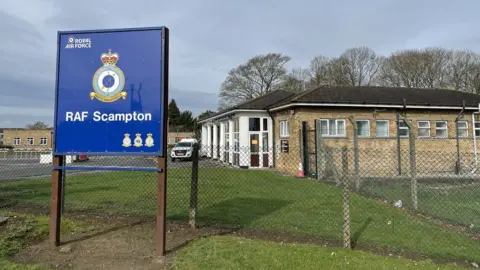Scampton asylum plan could cost £260m over 3 years
 PA Media
PA MediaThe cost of housing asylum seekers in a former RAF base in Lincolnshire could reach £260m by 2026, a leaked government document shows.
Ministers have argued placing asylum seekers on sites like RAF Scampton would be cheaper than using hotels.
But a Home Office memo written just days before plans were announced found the change only represented "marginal" value for money over three years.
The Home Office said the plan "cuts the burden on the taxpayer".
A leaked note, written for a senior official on 24 March, estimates total costs of asylum accommodation at Scampton this financial year to be £108.9m, then £97.1m in 2024/5 and £51.9m in 2025/6.
The memo, described as "final" advice to the Home Office's accounting officer, acknowledges the estimates were subject to change and based on various assumptions, including 150 beds being available from May 2023, an 85% occupancy rate over the contract period.
So far, no overall cost figures attached to the project have been made public.
The document goes on to say that the planned two-year holding period of the site "does not represent value for money" as it is not long enough to recoup the initial set-up costs through savings on hotels.
It suggests the Scampton proposal would be £2m more expensive over two years but could come to represent "marginal" value for money over three years. This depended on projected hotel usage over the period and whether planned modular units on the site could be connected to mains utilities, something described as a "critical risk".
Five days after the note was sent, the Home Office announced plans to house asylum seekers on multiple former military bases including RAF Scampton and MDP Wethersfield.
'Staggering waste'
The plan has been fiercely opposed by the local authority, West Lindsey District Council, which says it will also lose out on a £300m investment to redevelop the base, the former home of the Red Arrows and the World War Two squadron.
The council's legal challenge to the proposals was heard in the High Court this week.
The Conservative MP for Gainsborough, Sir Edward Leigh said the figures showed a "staggering waste of public money" and described the plans in his constituency as a "political gimmick".
The site is not yet operational, but the Home Office eventually intends to use the Scampton site to house up to 2,000 men.
West Lindsey Council argues the plans are unlawful, claiming the government has misused Class Q emergency planning permission to begin development.
The judicial review is also being brought by Braintree District Council and a local resident over similar plans for a military site in Wethersfield, Essex.
It emerged ahead of the court hearing this week that the Home Office intends to apply for permission to use the sites for a further three years.
"Frankly, I was lied to repeatedly," Sir Edward told the BBC earlier this week.
"First of all I was told it was going to be two years, and then it was going to be three years, and then it was going to save money. There's no value for money. Their whole case, I believe, is shot to pieces."
'Soft touch'
One government source close to the project acknowledged there had been high costs associated with developing Scampton, including the legal challenge and also the removal of asbestos.
The source argued this development showed assets on the site were being improved.
But the source insisted using larger sites to house asylum seekers was a better alternative to hotels.
"Hotels are fundamentally a bad form of accommodation - they are economically damaging to communities, they take away a really important resource," the source said.
"They are inappropriate and add to a perception of the UK as a soft touch - other governments in Europe don't use hotels for asylum seekers."
Latest figures from the Home Office annual accounts published in September showed the daily cost of accommodating asylum seekers in hotels had risen to £8m a day.
Immigration Minister Robert Jenrick recently announced 50 hotels would be closed over the next three months.
A Home Office spokesperson said: "Delivering accommodation on surplus military sites provides more orderly, suitable accommodation for those arriving in small boats whilst helping to reduce the use of hotels.
"This also cuts the burden on the taxpayer and ensures that every pound of their money is spent in the most effective way.
"We are confident in our project, which will house asylum seekers in safe and secure accommodation, while continuing to work closely with local councils to address local community concerns."
